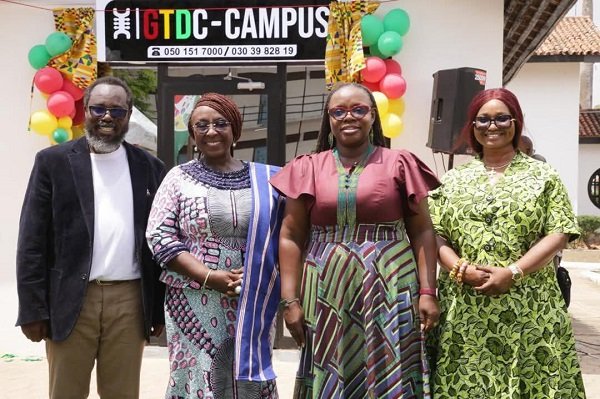News
UMaT retains W/R Indece Day inter-district quiz competition

The University of Mines and Technology (UMaT) Basic School, Tarkwa, in the Nsuaem Municipality of the Western Region, has retained its championship title at the fifth annual Western Region Independence Day Inter-District JHS Quiz Competition held recently at Tarkwa.
UMaT Basic School obtained 82 points to beat Christ Leading International School from Ellembele, and Peace International School from Jomoro Municipality to the second and third positions with 77 and 76 points respectively.
The S.I.P.L School from the Wassa East District placed fourth with 69 points, whiles St Anthony Roman Catholic School from Effia Kwesimintsim placed fifth with 60 points and St Augustinus Preparatory School from Nzema East placed sixth with 58 points.
The eleven schools, which represented Metropolitan, Municipal and District Assemblies (MMDAs) in the competition were chosen based on their performance at the 2019 Basic Education Certificate Examination (BECE).
The contestants were quizzed on issues pertaining to the history of Ghana (pre and post colonial, pre and post independence), chieftaincy and tradition, Information Communication Technology (ICT), Arts and Culture, Science and environment, sports and general knowledge.
Nana HRH Tetrete Okuamoah Sekyim II, the Paramount Chief of Wassa Amenfi Traditional Area, and chairman of the programme, commended the students for their excellent performance, and urged them to remain focused in their studies.
He asked teachers to adhere to the ethics of the profession and refrain from unacceptable activities that jeopardised their work.
The Executive Chairman for the planning and organising committee, Nana Obrempong Hima Dekyi XIV, the Paramount Chief of Upper Dixcove Traditional Area, thanked the numerous sponsors for their invaluable assistance and their determination to ensure that education was accorded the importance it deserved in the region.
He said the competition was designed to improve the abilities of the contestants, inculcate in them team work and added that this year’s performance was better than the previous year’s.
Mr Gilbert Asmah, the Municipal Chief Executive (MCE) of Tarkwa Nsuaem on behalf of the Western Regional Minister, said the promotion of historical values of Ghana would provide the appropriate platform for the development and growth of the country.
He urged the MMDAs and District Education Directors to enforce measures to raise the level of education in their areas.
Mr Addo Dankwa Akuffo, the Western Regional Director of Education who congratulated the participants for their sterling performance, also commended the sponsors for their invaluable assistance.
Mr Robert Siaw, the Regional Manager for Community Relations, Goldfield Ghana Limited, headline sponsors of the quiz competition, said education held the key to development and that was why Goldfield had agreed to sponsor the programme.
Ms Sally Acheampong, the CSR Coordinator of Takoradi International Company (TAQA-TICO), commended the traditional leaders of the region for championing education which was in line with TICO’s vision.
The winners of the competition received prizes some of which included a trophy, HP laptop, multipurpose printer, medals, textbooks, plaques and certificates. They also received Mathematics, Science, English and Information Communication Technology textbooks.
News
Afenyo Markin urges Majority to stop displaying placards against Ken Ofori Atta in Parliament

Minority Leader in Parliament, Alexander Afenyo Markin, has appealed to members of the Majority caucus to stop displaying placards bearing the name and image of former Finance Minister Ken Ofori-Atta on the floor of Parliament and describing him as corrupt.
His appeal followed concerns raised by the Council of Elders of the New Patriotic Party and members of Mr Ofori Atta’s family over how his image was used on placards during the recent State of the Nation Address in Ghana.
Addressing the House, Mr Afenyo Markin explained that no court has found the former finance minister guilty of corruption and therefore cautioned against actions that could damage his reputation.
He indicated that although political disagreements are normal in Parliament, deliberately printing and displaying Mr Ofori Atta’s pictures in a negative manner, especially when the attention of the world was on the chamber during the address, was inappropriate.
Mr Afenyo Markin therefore appealed to the Majority leadership, particularly the Chief Whip, to ensure that such actions are controlled or stopped in the future to maintain peace in the House.
He revealed that the Council of Elders of his party had summoned him to ask what steps the caucus was taking in response to the incident.
The Minority Leader also acknowledged concerns raised by a member of Parliament who is a relative of the former finance minister and had persistently drawn attention to the issue in the chamber.
He stressed that Mr Ofori Atta remains a human being with a family and reputation that should not be unfairly attacked.
Mr Afenyo Markin added that he did not intend to litigate the matter but was making a respectful plea to the Majority leadership to end what he described as the continued persecution and attacks on the former finance minister’s name in the chamber.
By: Jacob Aggrey
News
GTDC launches Campus Tourism Office at University of Ghana

The Ghana Tourism Development Company, GTDC, under the leadership of Prof.Kobby Mensah has launched GTDC Campus Tourism Office at the University of Ghana.
The initiative aims to promote educational and domestic tourism by providing structured campus tour experiences showcasing key heritage sites, including the Archaeology Museum and the School of Performing Arts.
It will also offer students their first travel experience across the continent and inculcate in them love to visit Ghana’s heritage sites.
Addressing the gathering at the launch yesterday, the Minister of Tourism, Culture and Creative Arts, Abla Dzifa Gomashie, described tourism as a vehicle for education and heritage preservation, stressing that the sector must inspire citizens to value and protect national culture for future generations.
The minister highlighted tourism’s connection to disciplines such as history, the arts, economics and environmental science.
The minister further noted that the private sector is the engine of tourism economy, adding that the engines require fuel, which is talents.” by investing in these young people today, you are securing the quality, the innovation and competitiveness of our own industry for tomorrow.
She added that the establishment of the office represents a deliberate investment in the intellectual capital of the country.
The GTDC boss, Prof.Kobby Mensah, said,”at GTDC, we believe that if our tourism has to be sustainable, we have to promote domestic tourism and a very big part of it is getting students to appreciate tourism and helping them to organise tours.”
He added that the University of Ghana itself is a huge heritage site which must be explored.
Prof.Kobby Mensah noted that the initiative, which is one of many to be established across the country, is a joint partnership between GTDC and University of Ghana.
The Vice Chancellor of the University, Prof.Nana Aba Appiah Amfo, said the University is a custodian of heritage which goes beyond the structures and welcomed the establishment of the first Campus Tourism Office.
She was optimistic that the office would be put to good use to achieve the intended purpose.
The launch brought together Stakeholders reaffirming their commitment to nurturing future tourism and hospitality professionals.
By Edem Mensah-Tsotorme






